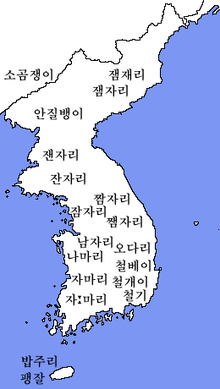Korean dialects
| Korean | |
|---|---|
Native speakers | 76 million (2007)[1] |
| Dialects |
|
| Language codes | |
| ISO 639-3 |
kor |
| Glottolog |
kore1280[2] |
 | |
A number of Korean dialects are spoken in the Korean Peninsula. The peninsula is extremely mountainous and each dialect's "territory" corresponds closely to the natural boundaries between different geographical regions of Korea. Most of the dialects are named for one of the traditional Eight Provinces of Korea. One is sufficiently distinct from the others to be considered a separate language, the Jeju language.
The standard language
- In South Korea, Standard Korean (표준어/標準語/pyojun-eo) is defined by the National Institute of the Korean Language as "the modern speech of Seoul widely used by the well-cultivated" (교양있는 사람들이 두루 쓰는 현대 서울말). In practice, it tends not to include features that are found exclusively in Seoul.
- In North Korea, the adopting proclamation stated that the Pyongan dialect spoken in the capital of Pyongyang and its surroundings should be the basis for the North Korean standard language (Munhwaŏ); however, in practice, it remains "firmly rooted" in the Gyeonggi dialect, which had been the national standard for centuries.[3]
Despite North–South differences in the Korean language, the two standards are still broadly intelligible. One notable feature within the divergence is the North's lack of anglicisms due to isolationism and self-reliance—pure/invented Korean words are used in replacement.
Regional dialects

Korea is a mountainous country, and Korean is consequently divided into numerous small local dialects. There are few clear demarcations, so dialect classification is necessarily to some extent arbitrary. Nonetheless, the following divisions are commonly cited in the literature:
- Hamgyŏng dialect, also called Northeastern dialects. Spoken in the Hamgyong Province (Kwanbuk and Kwannam) region, the northeast corner of Pyongan Province, and the Ryanggang Province of North Korea as well as the Yanbian Korean Autonomous Prefecture of Northeast China (in Jilin). Nine vowels: the eight of the standard language plus ö.
- Northwestern dialects
- Pyongan dialect: spoken in Pyongyang, Pyongan Province, Chagang Province, and neighboring Liaoning, of China.
- Hwanghae dialect: spoken in Hwanghae Province of North Korea. Commonly included among the Central dialects, but do not fit there comfortably.[3]
- Yukchin dialect. Spoken in the historical Yukchin region of northeastern North Hamgyŏng province, far removed from P'yŏng'an, but has more in common with P'yŏng'an dialects than with the surrounding Hamgyŏng dialects. [3] It is the only known tonal Korean language.[4]
- Central dialects.[3] Commonly divided along provincial boundaries:
- Gyeonggi dialect, also called the "Seoul dialect": spoken in the Gyeonggi Province, Seoul and Incheon cities, as well as southeastern Kaesong (North Korea). The basis of the standard language for both Koreas.
- Yeongseo dialects: spoken in Yeongseo, Gangwon Province (South Korea) and neighbouring Kangwon Province (North Korea) to the west of the Taebaek Mountains. Though commonly subsumed under Gangwon dialect, Yeongseo is quite distinct from the Yeongdong dialects to the east of the mountains.
- Chungcheong dialects: spoken in the Chungcheong Province (Hoseo) region of South Korea, including the city of Daejeon.
- Yeongdong dialects: spoken in Yeongdong, Gangwon Province (South Korea) and neighbouring Kangwon Province (North Korea) to the east of the Taebaek Mountains. Though commonly subsumed under Gangwon dialect (강원 방언), Yeongdong is quite distinct from the Central Korean dialects to the west of the mountains.[3]
- Gyeongsang dialects, also called Southeastern dialects: spoken in Gyeongsang Province (Yeongnam) of South Korea, including the cities of Daegu, Busan and Ulsan. This dialect is easily distinguished from the Seoul dialect because its pitch is more varied. Six vowels, i, e, a, eo, o, u.
- Jeolla dialect, also called Southwestern dialects: spoken in the Jeolla Province (Honam) region of South Korea, including the city of Gwangju. Ten vowels: i, e, ae, a, ü, ö, u, o, eu, eo.
- Jeju language is spoken on Jejudo off the southwest coast of South Korea and is sometimes considered a separate Koreanic language.[5] The nine vowels of Middle Korean, including arae-a (ɔ). May have additional consonants as well.
A recent statistical analysis of these dialects suggests that the hierarchical structure within these dialects are highly uncertain, meaning that there is no quantitative evidence to support a family-tree-like relationship among them.[6]
Outside of the Korean peninsula
- Koryo-mar (Autonym: Корё мар/고려말, Standard Korean: 중앙아시아 한국어), usually identified as a descendant of the Hamgyŏng dialect, is spoken by the Koryo-saram, ethnic Koreans in the post-Soviet states of Central Asia. It consists of a Korean base vocabulary, but takes many loanwords and calques from Russian and the Turkic languages.
- Zainichi Korean language (재일어; 재일조선어) is a language or a dialect spoken among Koreans in Japan, strongly influenced by Japanese.
- Korean language in China (중국조선) As discussed above, Koreans in China use a dialect nearly identical to Hamgyŏng dialect in North Korea, but there are still some differences, as the former has many modern terms that came from Chinese.
Classification
| Korean |
| |||||||||||||||||||||||||||||||||||||||
See also
- Koreanic languages
- Regions of Korea
- Tsushima dialect, a Japanese dialect containing loanwords from Korean.
References
- ↑ Nationalencyklopedin "Världens 100 största språk 2007" The World's 100 Largest Languages in 2007
- ↑ Hammarström, Harald; Forkel, Robert; Haspelmath, Martin; Bank, Sebastian, eds. (2016). "Korean". Glottolog 2.7. Jena: Max Planck Institute for the Science of Human History.
- 1 2 3 4 5 Lee & Ramsey, 2000. The Korean language
- ↑ 朝鲜语六镇话的方言特点
- ↑ Janhunen, Juha (1996). Manchuria: An Ethnic History. Finno-Ugrian Society. ISBN 978-951-9403-84-7.
- ↑ Lee, Sean; Mokrousov, Igor (29 May 2015). "A Sketch of Language History in the Korean Peninsula". PLOS ONE. 10 (5): e0128448. PMC 4449120
 . PMID 26024377. doi:10.1371/journal.pone.0128448.
. PMID 26024377. doi:10.1371/journal.pone.0128448.
External links
- 国立国会図書館デジタルコレクション - 朝鮮語方言の研究. 上卷下卷 Korean dialect word differences